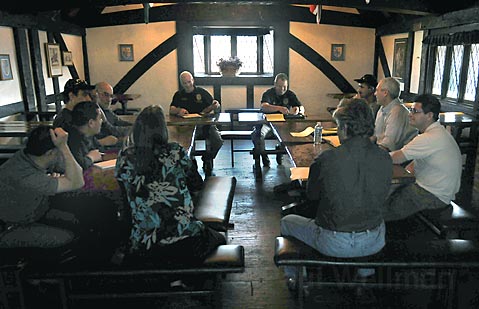Cabbies Meet with Cops
Drivers Object to Tickets for Stopping on State Street

A second meeting between cabbies and cops was distinctly friendlier and more productive than a confrontation that took place previously in the Santa Barbara City Administrator’s office. This meeting took place upstairs on Thursday, February 19, at Rusty’s Pizza Parlor, where Sgt. Riley Harwood and Lt. David Whitham showed up in street clothes to again listen to cabbies’ complaints about the stresses of trying to operate in the city, starting with all the tickets that cab drivers get when picking up fares on State Street when the bars let out.
Whitham drew his line in the sand a few minutes after the beginning of the hour-long meeting attended by eight cab drivers, some of them also cab company owners. Cabbies wanted to know why police are issuing them tickets at 1 a.m., when there is little traffic on State Street aside from the cabbies and partying pedestrians, the last of which rely on cabs to get home. “One thing I won’t do,” Whitham said, “is tell officers not to enforce or to enforce selectively.” Having taxis stop on lower State to take on passengers “is not something I want,” Whitham said. “Now I’ve got six people standing in the number two lane [to catch cabs or get into them]. I have absolutely no problem ticketing any cabbie who slows down when it’s not appropriate.”
By the end of the meeting, the officers had offered to work with the cabbies on any definite proposals they bring to the table, especially one for several additional taxi stands on downtown side streets. The officers were less enthusiastic about the idea of zones on State Street itself where cabs could pull up to the curb to pick up fares. In any case, they told the cabbies to meet with city councilmembers, who actually write the laws, as well as with the Downtown Organization, an excellent ally with considerable lobbying power within city government and a shared interest in regulating after hours traffic.
Also on the cabbies’ wish list were the right to stop in freight-loading zones and to double park for up to one minute. They noted that freight-hauling commercial trucks are allowed to double park. Whitham explained, however, that freight haulers never used to be able to until they exercised their lobbying power with state legislators. He recalled the day he was forced to cease and desist writing tickets for such behavior.
An even hotter issue is the increasing number of new cab companies. Larger, established companies groused about tactics that they said threaten not only their businesses but also the industry at large. For example, only a few of the newer companies are there for the public 24/7 year-round – they just swoop in for rush hour. In addition, owners said intruding companies have a habit of painting their cabs the same color as, say, Yellow Cab or Rose Cab, and then, allegedly, destroying the older cab companies’ reputations because customers don’t see the distinction.
Then too, the sheer number of cab companies makes it difficult for anybody to make a decent living, the cabbies said, suggesting that criteria to narrow the field could be implemented-such as a requirement that companies maintain an office and dispatcher rather than just the phones in the cabbies’ cars. After philosophizing briefly about free markets and competition, the officers seemed to warm to the idea, suggesting that stricter standards for drivers’ safety records might help separate the wheat from the chaff.



